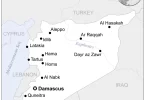While the political characteristics of the West Bank and that of Nagorno-Karabakh are very different, for the US Secretary of State, Pompeo, to claim that conditions on the West Bank of the Jordan River do not violate international law while the US holds a co-chair position on the Organization for Security and Cooperation in Europe’s Minsk Group is the laughable height of hypocrisy. The Minsk Group “spearheads the OSCE’s efforts to find a peaceful solution to the Nagorno-Karabakh conflict.” The OSCE co-chaired by France, the Russian Federation, and the United States.
While it is difficult enough reconciling hypocritical positions on multiple conflicts, another is to negate and selectively apply international norms. Regardless of one’s position on Israel’s exercising sovereignty and supporting Jewish settlement on the West Bank, the excuses used by Pompeo can now apply to disputes where his deliberate misinterpretation of established norms apply much better.
Let’s look at the case of the “disputed” region of Nagorno-Karabakh, between Armenia and Azerbaijan. The main political difference between the West Bank and Nagorno-Karabakh is that the latter had always had a majority Armenian population spanning thousands of years, upwards of well over 90% before it was taken from Armenian control and placed under Soviet Azerbaijani jurisdiction by Stalin. Even at the time of the disintegration of the Soviet Union, Armenians comprised about two-thirds of the population and they periodically petitioned the Kremlin for Nagorno-Karabakh to be placed under Soviet Armenian jurisdiction. As the Soviet Union disintegrated, the Armenians of Nagorno-Karabakh fought and won the right of sovereignty over this region and today run their affairs without Azerbaijani domination. Nagorno-Karabakh’s political status is different than that of the West Bank.
The following compares and contrasts the political conditions in Nagorno-Karabakh concerning Pompeo’s, and just after, Netanyahu’s reaction in the form of claims and contrasted realities in NK.
West Bank Claim 1
- “Reality on the ground in the West Bank.”
Reality in Nagorno-Karabakh
- Armenians maintain 100% sovereignty over NK
- No Azerbaijanis live in NK
* * *
West Bank Claim II
- “…who is right and wrong as a matter of international law will not bring peace.”
Reality in Nagorno-Karabakh
- Azerbaijan claims “inviolability of recognized borders.”
- Armenians claims the “right of self-determination.”
* * *
West Bank Claim III
- “Jewish people are not foreign colonialists in Judea and Samaria,”
Reality in Nagorno-Karabakh
-
Armenians have always lived and been a majority in NK
* * *
It becomes unclear why Armenians even bother to meet with their Azerbaijani counterparts under the auspices the OSCE’s Minsk Group with such rabid hypocrisy exhibited by the United States. It’s bad enough that Azerbaijan demands Armenians unilaterally give up their hard-won sovereignty over Nagorno-Karabakh, why should Armenians play when the rules change in the middle of the game. Following Pompeo’s suggestion, Armenia should annex Nagorno-Karabakh.
Pompeo’s message to Azerbaijan that its land claims on Nagorno-Karabakh are built on shifting sands and that “reality on the ground” for the Armenians of Nagorno-Karabakh says it all.
Yerevan, Armenia




